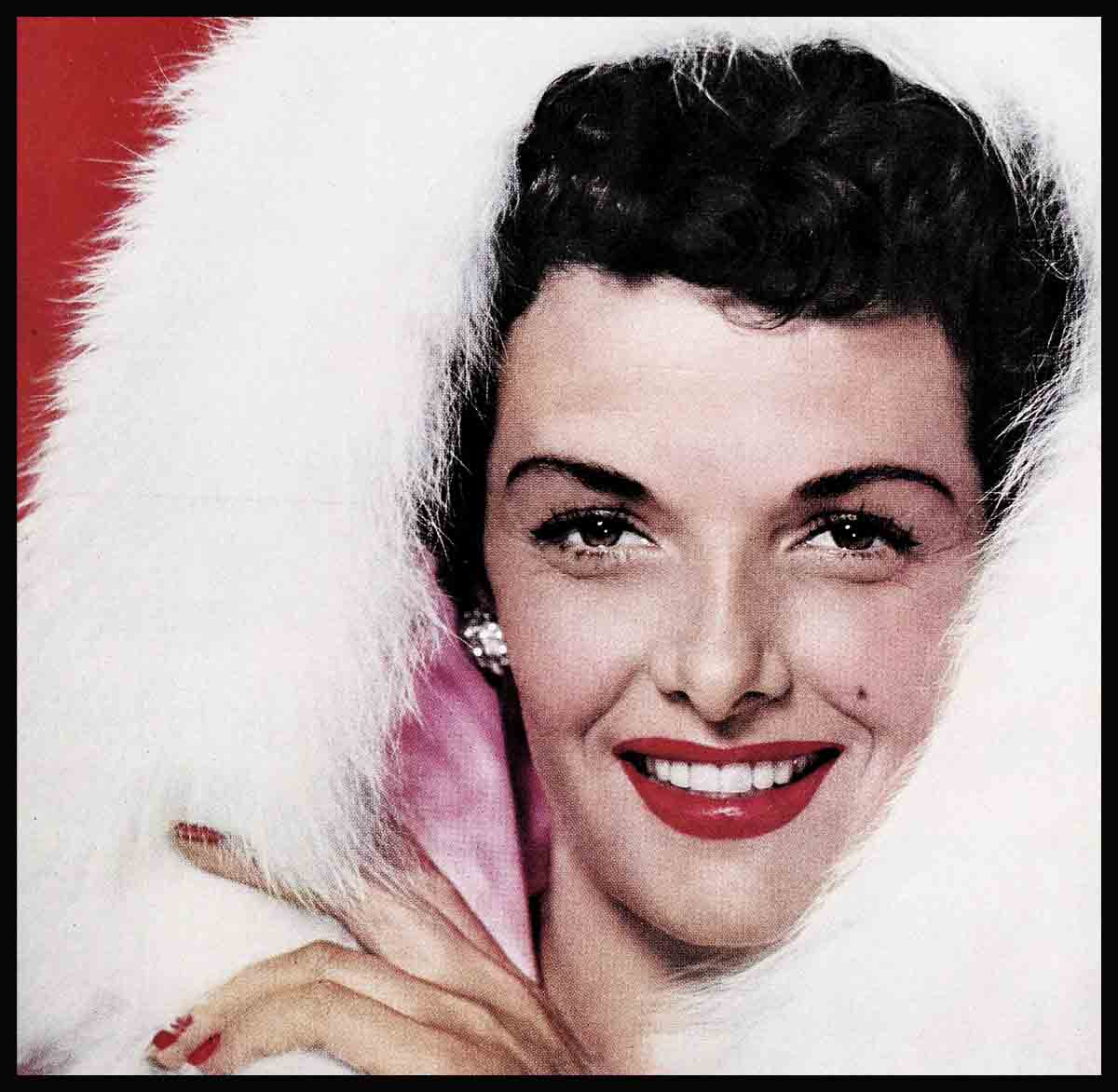
Happy-Go-Lucky Firebrand—Jane Russell
Jane Russell, the focal point of more inane chatter than any other Hollywood personality—with the possible exception of Marilyn Monroe—has spent fifteen years in building a career. But twelve of those years were even more intensely devoted to the building of a marriage.
Recently Jane signed a new contract with Howard Hughes, which will pay her $1000 per week for the next twenty years. In addition to this she has with her husband, Bob Waterfield, formed her own company—the RussField—which promises to be even more lucrative. Dunn and Bradstreet conservatively consider this achievement remarkable. Hollywood, in turn, looks upon her success in marriage as colossal. Ask Jane which, in her opinion, is the more important and you’ll get an answer as definite as a dropped option. She is grateful that her career has turned out so well. But she thanks God daily for her marriage.
“I have had wonderful breaks in Hollywood,” she says. “I also have a fair amount of brains and, let’s face it, a publicity build-up the like of which no one else ever had. Pure unadulterated luck has been an important element in my career.
“As regards my successful marriage, I possess a secret. I got it from my mother, and she,
I feel certain, got it straight from Eve. It is this: never forget to let the guy you’re in love with know that he’s the big wheel in your wagon. And if, being in love.with you, he shows signs of disregarding it, put him back on the right track. Men are funny. Since the days when they dragged their women into some bachelor cave by the hair, they’ve been thinking of themselves as the ones who bring home the bacon and, as such, entitled to a little hero worship. And they’re absolutely right. It is only in the last generation that women have been thrusting themselves into economic, political and domestic equality, even going so far as to feel superior to the men they’ve married. And let me tell you something. The day we accomplish this, will be a sad one for women all over the world. We’ll realize, too late, that something precious has gone out of our lives; that men no longer look upon us as beings to be shielded and loved. We asked for equality in all things and we’ll get it—right on the button.”
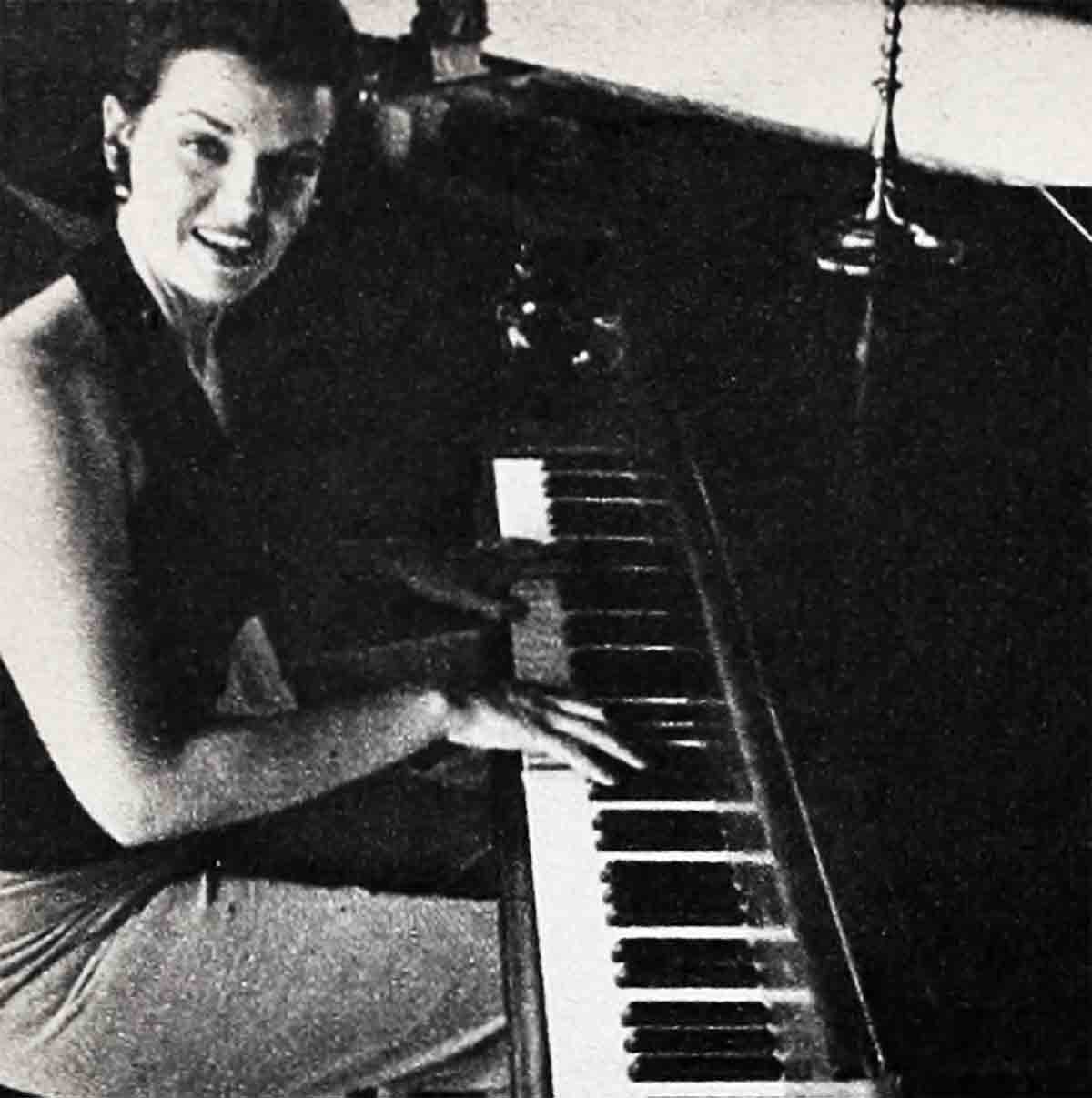
Miss Russell thinks that being reared in a family composed largely of males was one of the most fortunate things that ever happened to her. The eldest of five children and the only girl, she learned early how to get along with men. Her father, a sternly religious man, was old-fashioned enough to make the Bible a strong factor in his life and to believe that a man was the head of his house. Her wise mother lovingly assured him that he was right. She taught her children that their father was the final authority; that God was the author of their being; that He was responsible for all the good which might befall them in life, providing they used the talents He gave them. Miss Russell believes these things as firmly today as she did when she was a mere ten years old.
“Even now,” she said, “I find myself more at ease in the company of men than I do with women. I think its the result of years of trying to get along with the male ego of my brothers and the authority of my father. What I learned as a kid at home has helped me over a lot of hills in my marriage.”
In Hollywood, where rumor often parades for truth, Jane has been able to emerge with her married life unscarred, with only a few scratches. When in Las Vegas for the premiere of her picture, “The Las Vegas Story,” she accidentally acquired a lulu of a black eye in getting out of a car as a gust of wind slammed the door in her face. It happened that Bob Waterfield, her husband, who rarely accompanies his wife to premieres, had preceded her to Las Vegas, hoping to get in a couple days of fishing at Lake Mead. Being one who does not like premieres, even though the picture happens to be one that stars his wife, Bob left Las Vegas earlier so he was unaware of Jane’s black eye.
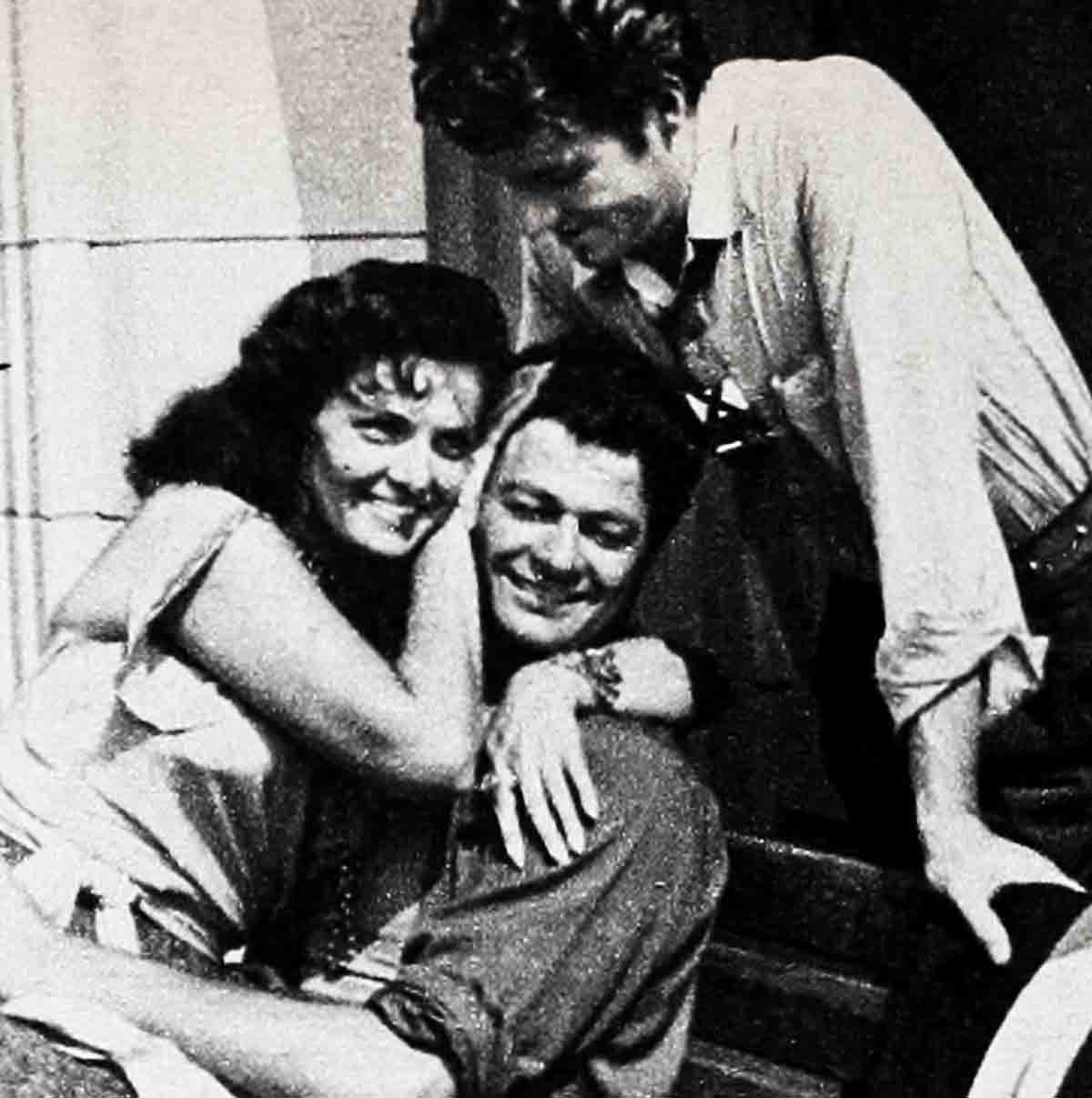
Knowing that Waterfield had returned to Los Angeles and getting a gander at Jane’s purple eye, the newsmen and wire service writers put two and two together and came up with ten. Jane, they thought, and her individualistic spouse had finally had the big fight. Being good reporters they called Jane on the phone. She gave them the facts and they printed them—but with a sly, tongue-in-cheek shading which permitted the reader to say, “Oh, yeah?”
On the following day before boarding her plane for home, Jane called her husband on the telephone. “Here we go again, honey,” she said. “Have you seen the papers?”
“I heard some rumors. Looks like I showed you!”
“That’s what the reporters think. So you’d better be at the airport to meet me, even though the studio will have a car there to take me home.”
It was the end of that particular rumor and Jane smiles about it now. “I don’t blame the reporters,” she said. “They have their job to do and generally they’re as fair as one could ask. After all, I did have a shiner that looked as if I’d walked into a mule’s hind hoof—and Robert had taken off for home.”
A warmhearted girl who admires talent in others and likes to acknowledge it, Jane is often the target of venom-tipped gossip coupling her with her leading men. It doesn’t seem to matter greatly what the situation amounts to or who the male lead happens to be. The whisperers require only that he be handsome and verile looking. Bob Mitchum was the perfect party of the second part. Talk began to be heard at cocktail parties. “That Mitchum!” the behind-the-scenes critics said, “with his pantherish walk and cool, woman-baiting eye! Did you see how he kissed her in their last picture? Now far be it from me to spread, but. . .”
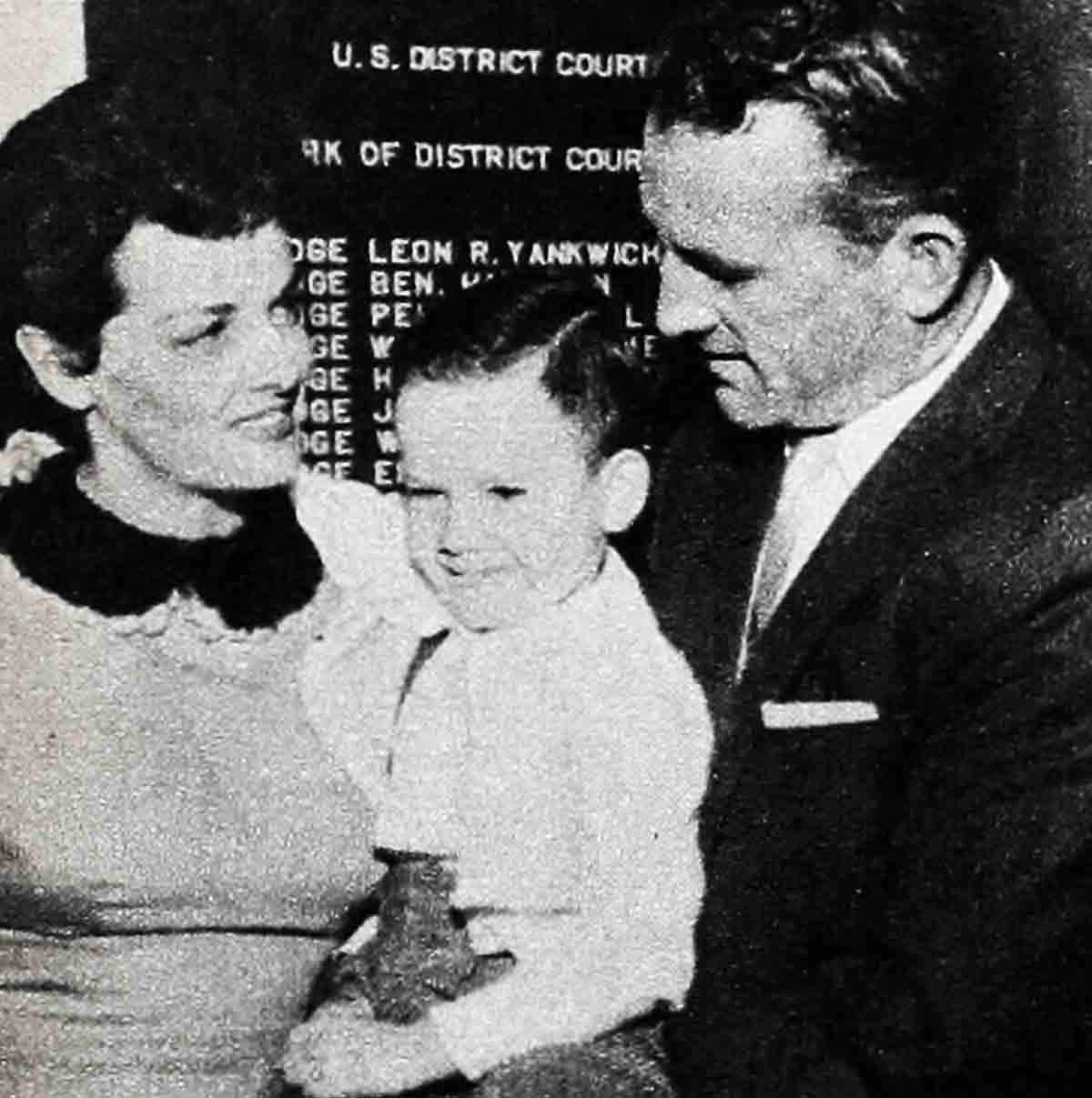
When the Mitchum talk faded out through sheer inanition and the fact that Dorothy Mitchum and Jane continued to be close friends, the whisperers seized upon Richard Egan. “Gossipers even call the studio,” an RKO publicist said. “With each new story we can expect, almost mathematically, a certain number of inquiries.”
Asked if her husband was ever aware of this vicious gossip, Jane said: “He never gave the slightest indication of it. Robert has a remarkable faculty of keeping his mind free of such garbage. That is one of the things that has contributed largely to our happiness together.”
Another ability of Bob’s which has helped keep their marriage free from the petty squabbles that have wrecked so many others, is his insistence that they lead their own professional lives. For instance, he has never expressed an opinion regarding his wife’s roles in pictures. He recognizes Jane’s obligations to Howard Hughes, to whom she is under personal contract, and has confidence in her own judgment. “When ‘The French Line,’ a picture that was pretty sharply criticized, came out,” Jane said, “Robert never so much as offered an opinion. I suppose he saw it, but he didn’t talk about it at all to me.”

RKO, too, has never had to be concerned about her husband interferring in any way with normal picturemaking routine. Jane recalls only one instance where Bob exercised his authority as her husband—and even then it was by invitation.
“This happened while I was making ‘Gentlemen Prefer Blondes’ at Twentieth,” Jane said. “It was a pretty strenuous picture and I was working very hard. Suddenly, in the middle of a scene I collapsed. I came to in my dressing room and started to give them the old line that I’d be okay in a couple of minutes, you know, but they didn’t believe me. Instead they called Robert and he hurried out to the studio. He took one look at me and said: ‘You’re going home, honey.’ That was one time when I gave him no arguments. I just followed.”
Miss Russell, however, is quick to dispel any impression that her home life with Bob is one long lilting song of tranquillity. It isn’t. Despite her best efforts she has been unable to conquer her great and abiding fault—trigger-quick impatience. She wants speech, action, written communications, everything, pared to the bone; has utterly no time for embroidery or nonessentials.
Waterfield, a deliberate, logical-thinking person, likes to prepare the groundwork of any discussion he has with his wife. She can stand it only so long and then explodes like a hand grenade. “We get to the point fast enough, then,” she said, “and I spout a lot of harsh things I’m sorry for a second later. So far, our quarrels—and there have been plenty—have never got out of hand and I don’t believe they ever will. If that ever happens, it will be my fault.”
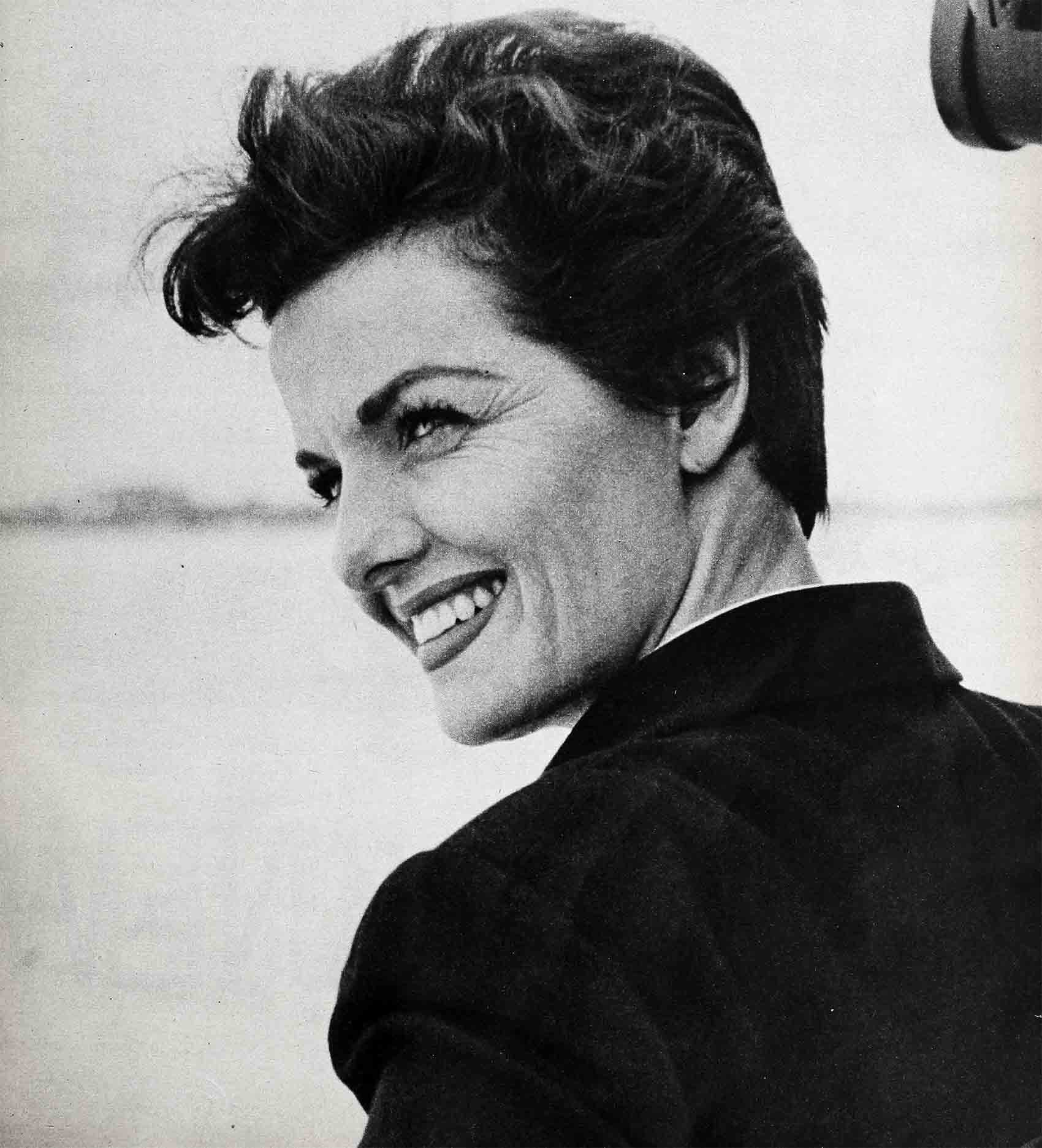
One of the biggest flaws in their marriage has been Jane’s frequent and lengthy absences from home on personal-appearance tours. A self-contained, nongregarious man who avoids Hollywood gatherings, Bob chooses to remain at home and play golf when his wife is away on some exploitation junket. Of late, however, these lengthy trips have grown fewer and fewer. The reason for this is that Bob, finding himself increasingly alone on Saturdays and Sundays reacted like any normal male. He expressed his resentment by weekend golf sessions with other addicts while Jane, when home, sat, lonely in the living room, wondering what had happened.
They both quickly saw they were drifting apart. “I’m not certain which of-us made the first move,” Jane said, “but I think I did. Anyway, we got the trouble talked out and came up with an understanding. I’d cut the trips to the barest minimum and he’d drop golf on Sundays. Now when my studio calls up and outlines a new personal-appearance tour, I say, ‘Sorry. My old man wants me to stay You’ll have to talk to him about it.’ ”
So it has been only within the last eighteen months that Robert has identified himself in any manner with his wife’s career in motion pictures. Until that time, his attitude was coolly, even remotely objective toward the films in which Jane appeared. He kept his nose deep in his own business—football and related activities.
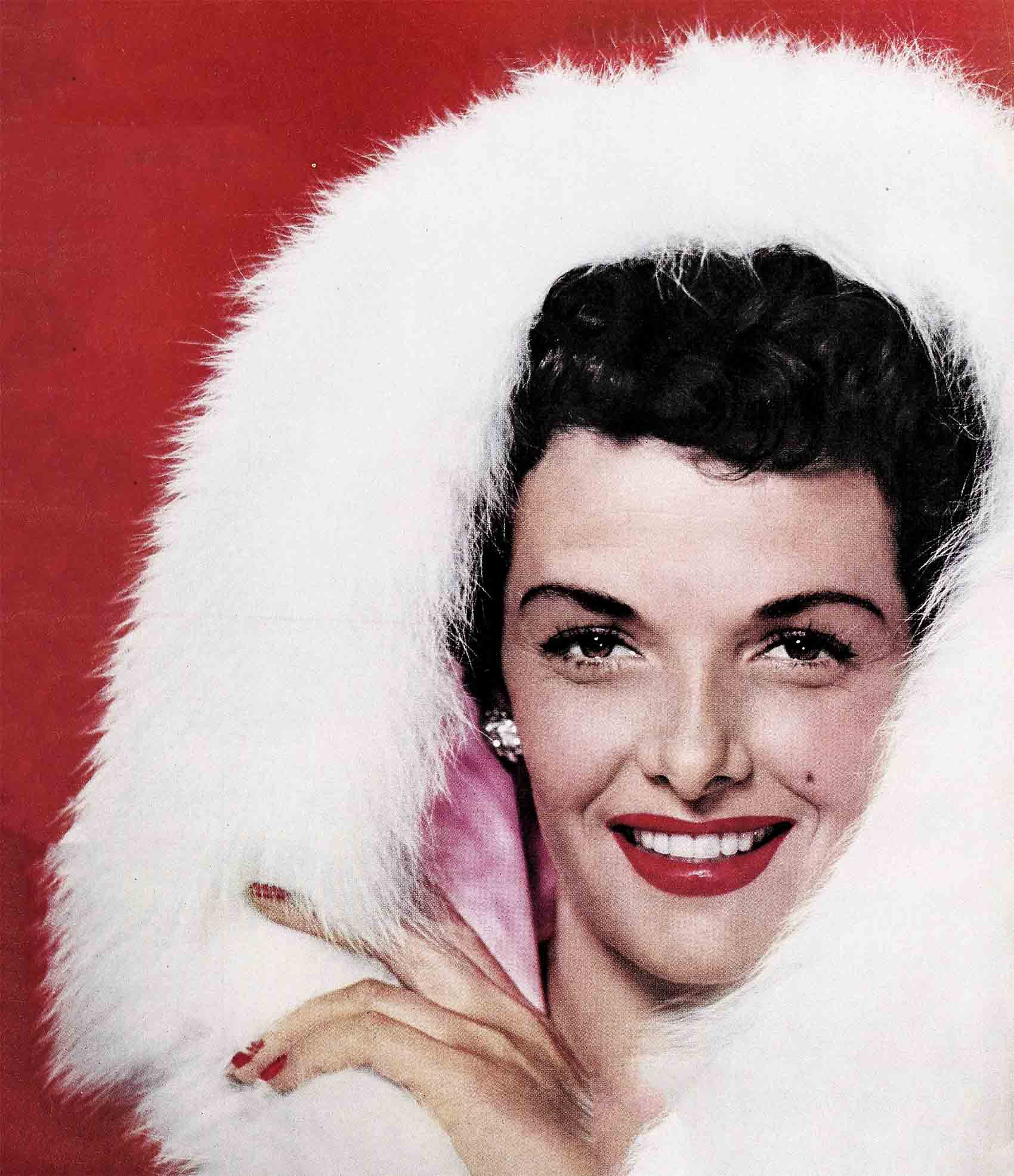
Then, with the organization of Russ-Field, Bob became president and immediately found himself floundering in the unfamiliar movie element.
“I was aware that he was suffering,” Jane said. “I could almost see him lose weight as he lay awake night after night, trying to think his way through a pretty dark time. But I knew something else, too. Robert had to fight this out on his own. So I stood womanly by, watching him grow more and more harassed and careworn. Then, quite suddenly, he began to get his feet under him. I could see a new ease, a fresh confidence in his manner. It was like watching him in a football game when he was up against a pass defense that he couldn’t solve. The game would go along for one, maybe two quarters with the opposing backs and ends smearing every pass, every cute trick that Robert dreamed up. And then, suddenly, his long tosses down-field began to click, his deception was smooth as silk and the team started to come home.
“It’s the same now. Robert can talk to technicians in their own language and his skill in handling the business details of Russ-Field is amazing. I needn’t have worried in the first place, really. It was just that I hated to see him suffer. But I should have remembered how well he had always managed our family finances. From the beginning of our marriage, Robert collected my salary as well as his own and gave me an allowance. It worked out fine, but I never seemed to have much spending money, not even enough for tips in restaurants and parking-lot fees. It’s funny, actually, the number of times I’ve had to confess I didn’t have a dime with me. I’m still on a pretty scant allowance, for that matter.”
With the signing of her new Howard Hughes contract which calls for six pictures—three on loan-out to other studios and the others to be made when and where Hughes chooses—and with her husband assuming management of their new company, Miss Russell has reached the point in her career which she has been eagerly awaiting. Professional and financial considerations being largely eliminated, she can now devote much of her time to the rearing of her two adopted children, Thomas, five, and Tracy, a girl, four. Also she will have additional time for the child adoption organization called WAIFS, which she originated. There will be, too, greater opportunity for the selection of good stories for her future pictures. She hopes to find more like “Gentlemen Marry Brunettes,” Russ-Field’s first release, “Foxfire,” “The Tall Men,” “Tambourine” and “Underwater!” This last-named picture, incidentally, caused something of a furor in the Far East. “Japan has been spared the mambo until last fall,” said Time magazine, “when touring bandsman Xavier Cugat introduced it. But it did not really catch on until the Japanese saw Jane Russell do the Cherry Pink and Apple Blossom White mambo in the film ‘Underwater!’ ”
Today, everyone agrees, Jane is on the top of the world. Jane knows it, too. At the apex of her career, slangy, impatient, big-hearted, phony-hating Jane Russell is looking about, catching a long breath. With money in the bank, a husband who adores her and two healthy children, she’s thankful for her good luck. She’s built a world of happiness only complete revolution could destroy. And being Jane, you can safely bet she’s no intention of letting that happen.
THE END
—BY HYATT DOWNING
It is a quote. PHOTOPLAY MAGAZINE DECEMBER 1955





No Comments